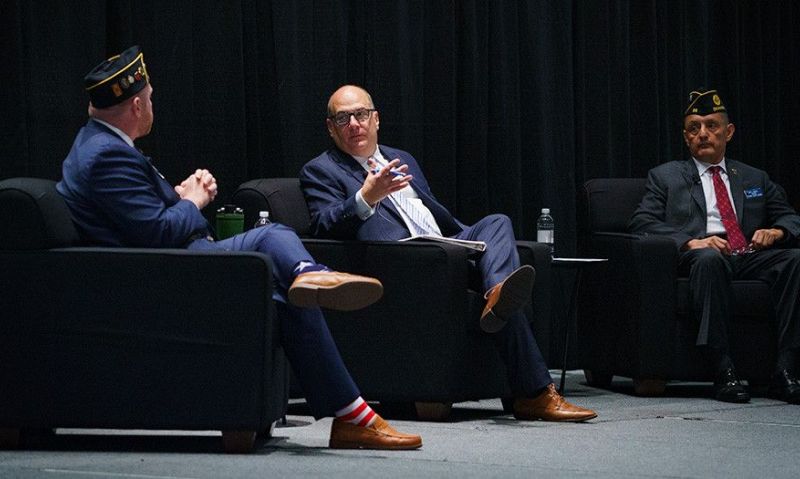
National Security Commission hears updates from the Department of Defense on financial and food security, child care and spousal employment for military families.
The American Legion launched its Base Assessment and Servicemember Experience (BASE) program in 2022 to help improve the lives of servicemembers and their families by hearing directly from them about their needs and working with the Department of Defense (DoD) on improving conditions. BASE addresses quality of life needs with childcare, healthcare, base housing, spousal employment, financial security, food security and more.
Hon. Ronald Keohane, assistant Secretary of Defense for Manpower and Reserve Affairs, addressed the Legion’s National Security Commission on Aug. 24 in New Orleans during the organization’s 105th National Convention to update on measures taken to improve quality of life for military families.
“I heard a veteran once say, ‘I volunteered but my family was drafted.’ That always stuck with me,” Keohane said. “I think about that statement every day when I’m in the office. It really gives me the energy to continue to work very hard at our various programs.”
In terms of economic security, Keohane said that servicemembers have seen an almost 10% pay raise over the past two years – a new active-duty recruit salary is a little over $50,000 a year – an 18% increase in basic housing allowance, and a minimum of 25% savings in the commissary compared to a local grocery store. Additionally, the Basic Needs Allowance program ensures that the household income for a junior servicemember with a large family is never at poverty level. And to a round of applause, Keohane said that the president’s budget included funding to increase the Basic Needs Allowance eligibility to provide more help for servicemembers in need.
Along with 12 weeks of paid parental leave for new mothers and fathers, the Department of Defense implemented a program last year for parents to take parental leave in smaller increments – 100,000 servicemembers took advantage of it.
“We are very proud of that,” Keohane said. “Taking care of our people absolutely includes our military families. The department acknowledges that the sacrifices made by the military families are critical.”
During a House Armed Services Committee’s Quality of Life panel attended by The American Legion in April, it was reported that one in four servicemembers face food insecurity, and more than one in five (22%) military spouses faces unemployment.
“We have recognized that food insecurity is a complex challenge for which there is no single cause,” Keohane said. “That’s why the department is taking a holistic view to assist our servicemembers and their families who experience food insecurity.”
Keohane said some servicemembers may experience food insecurity because of spousal unemployment, a military move, access to childcare or financial instability. To understand the challenges better and answer the why, the DoD has identified two populations of focus when it comes to food insecurity – junior enlisted unaccompanied servicemembers who may have challenges accessing dining facilities; and enlisted servicemembers in a single-income household who may experience more financial strain in effort to support their family. Besides looking at food accessibility, the department has a financial assessment tool to help servicemembers, has adjusted commissary hours, reduced commissary prices, created online shopping and grocery delivery services, and expanded healthy on-the go-foods.
“Not one servicemember should ever say they have food insecurity. It’s unacceptable and we are working on hard on that,” Keohane emphasized.
The DoD has created the website https://www.militaryonesource.mil/ for servicemembers to assist with financial help, food security, relocation needs, spousal employment, transferring of pets (servicemembers are now reimbursed $550 for instate move and $2,000 for overseas for one pet) and more.
As for spousal employment, the DoD is helping military spouses transfer of state licenses and certifications, find flexible employment, and find meaningful work by one of its 850 employer partners, which have hired more than 340,000 military spouses since 2011.
“Our military spouses across the board are far more educated than their peers in the civilian world, and we are working hard to provide a career path for them,” Keohane said. “And research shows that employed spouses are more like to support their servicemembers staying in the military.”
Military spouse employment and childcare are priorities for the DoD as safe, reliable and flexible childcare needs to be available for spouses to work. “It is a top priority in my office to deliver this to families,” Keohane said, adding that the department has adjusted the fees that parents pay to have their children in care on base, expanded childcare in neighborhoods, increased salaries for childcare workers, and servicemembers can contribute up to $5,000 pretax for childcare.
Another priority for the DoD is recruitment.
“For the first time in awhile we are seeing improvement. The Army, Marine Corps, Air Force and Space Force have all achieved their fiscal year to date recruiting mission for June 2024,” Keohane said, adding that the Navy fell short of a little over 6,000. “We are working hard on the call to service. Together with the White House, AmeriCorps, Peace Corps and Selective Service, the department is currently developing efforts to encourage the next generation of youth to pursue military, national health and service opportunities.
“It’s hard to aspire to something you don’t know about. This underscores the importance of The American Legion to share your service, share your stories when you go out and speak to youth.”
- Convention

